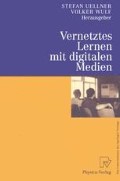Zusammenfassung
Es wird ein agentenbasiertes System zur dynamischen Informationsgewinnung für Lerneinheiten vorgestellt. Es dient der automatischen Aktualisierung von Literaturverweisen und Verweisen auf Arbeitsunterlagen. Desweiteren ermöglicht es die Bildung eines Gruppengedächtnisses bzw. eines Gruppenprozesses zur Bildung von Informationsressourcen in Form von themenbezogenen priorisierten Verweislisten.
Access this chapter
Tax calculation will be finalised at checkout
Purchases are for personal use only
Preview
Unable to display preview. Download preview PDF.
Literatur
Altavista, http://www.altavista.com.
Marko Balabanovic. Learning to Surf: Multiagent Systems for Adaptive Web Page Recommendation. PhD thesis, Stanford University, Department of Computer Science, March 1998.
R. Barrett, P. P. Maglio, and D. C. Kellem. How to personalize the web. In Proceedings of the ACM Conference on Human Factors in Computing Systems (CHI’ 97), 1997.
Thomas Dietinger, Ch. Gütl, Hermann Maurer, and Maja Pivec. Intelligent knowledge gathering and management as new ways of an improved learning process. In Proc. of WebNet98, Orlando, Florida, 1998.
N.C. Ingle. A language identification table. The Incrporated Linguist, 15(4):98–101, 1976.
Cay Kaben. Ping collection-agent und central-repository. Studienarbeit, FH Lübeck, Informatik, 1999.
Learning Object Metadata (LOM), draft document v2.2. IEEE Learning Technology Standards Committee (LTSC), http://www.manta.ieee.org/P1484/ltscdocs/index.html, 1998.
P. P. Maglio and R. Barrett. WebPlaces: Adding people to the web. In Poster Proceedings of the Eighth International World Wide Web Conference, 1999.
M. F. Porter. An algorithm for suffix stripping. Program, 14(3):130–137, 1980.
Gerard Salton and Chris Buckley. An Introduction to Modern Information Retrieval. McGraw-Hill, 1983.
Silke Seehusen. Virtuelle Hochschule ߞ Konsequenzen. In 3. Norddeutsches Kolloquium über Informatik an Fachhochschulen, Bielefeld, 1998.
Silke Seehusen. Lehr-und Lernformen in der Virtuellen Fachochschule. In Joachim Wedekind, editor, Virtueller Campus’ 99. heute Experiment-morgen Alltag?, Münster, 1999. Waxmann Verlag.
VFH. Virtuelle Fachhochschule für Technik, Informatik und Wirtschaft. http://www.vfh.de.
yahoo. http://www.yahoo.com.
Author information
Authors and Affiliations
Editor information
Editors and Affiliations
Rights and permissions
Copyright information
© 2000 Springer-Verlag Berlin Heidelberg
About this paper
Cite this paper
Seehusen, S. (2000). InGeL: Dynamische Informationsgewinnung für Lerneinheiten. In: Uellner, S., Wulf, V. (eds) Vernetztes Lernen mit digitalen Medien. Physica, Heidelberg. https://doi.org/10.1007/978-3-642-57673-7_14
Download citation
DOI: https://doi.org/10.1007/978-3-642-57673-7_14
Publisher Name: Physica, Heidelberg
Print ISBN: 978-3-7908-1291-6
Online ISBN: 978-3-642-57673-7
eBook Packages: Springer Book Archive

